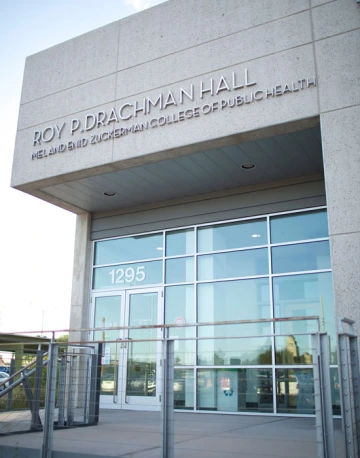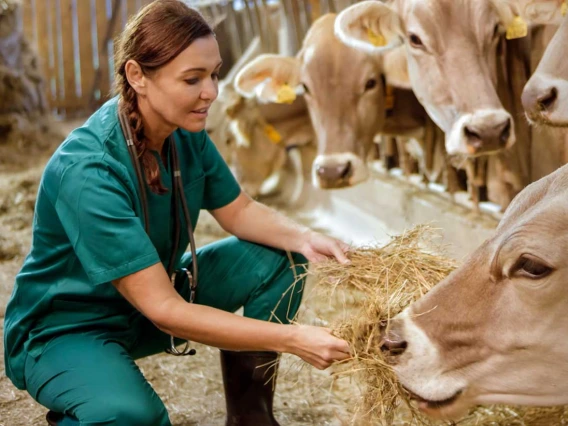Public Health Emergency & Epidemic Preparedness
Undergraduate Certificate
Quick Facts

4Industry-Specific
Certificates Earned
with Program Completion
Top 1%
of all Higher-Ed
Institutions
- Center for World University Rankings, 2024
Public health emergencies such as epidemics, pandemics, hurricanes and more continue to pose a severe threat to the health and safety of our world. Effective public health preparedness is more important than ever to respond to and recover from such emergencies. The Undergraduate Certificate in Public Health Emergency and Epidemic Preparedness provides you with the foundational knowledge and critical skills needed to support public health responses to such predicaments.
This program teaches you to assess emergency and disaster risks using a risk management approach. You will apply Disasters Risk Reduction (DRR) theories and strategies and describe epidemiological procedures for investigating outbreaks.
Developed and implemented by public health experts with extensive applied experience in public health emergency and epidemic preparedness and response, this certificate focuses on specialized training for a prepared workforce that goes beyond routine public health practice.
The Undergraduate Certificate in Public Health Emergency and Epidemic Preparedness introduces you to emergency management systems, various forms of disasters, public health threats, and essential public health response skills. Be trained to use epidemiological tools to conduct a rapid assessment and public health investigation of emergencies and disease outbreaks.
This undergraduate certificate is the first in the US to train on emergency and epidemic preparedness subjects. Students that choose to complete EHS 489 as a part of the certificate will complete a series of FEMA and contact tracing trainings as part of the course and will earn three FEMA certificates and a certificate in contact tracing. The FEMA certificates are open-source course modules that would be embedded into the certificate course.
This program can be completed in one year.
A prerequisite in MATH 112 or equivalent is required for this program.
*Residents of some U.S. Territories may not be eligible. Please see our Eligibility & State Authorization page for more information.
This certificate requires the completion of three required courses: EHS 110, EHS 320, and EPID 309. You may choose from a list of electives for your final three units to complete the certificate requirements.
Develop the knowledge and skills to work in national and international contexts, contributing to the prevention, mitigation and response of disasters.
This course will provide the opportunity to gain knowledge and skills about disasters risk reduction, disasters preparedness planning, emergency response and disaster recovery. The course focuses on the US context in addition to international contexts. You will learn about the National Incident Management System (FEMA), and crisis communication (CDC).
This course will introduce you to basic principles and methods used in epidemiology. The course will include basic research designs, estimating outcome measures, and establishing cause and effect and effectiveness of interventions to prevent and cure disease.
| This course provides a basic knowledge of public health preparedness and response using an all-hazards approach: nuclear, biological, chemical, and natural disaster, and an opportunity to apply this content in a mock critical incident event. |
Develop the knowledge and skills to work in national and international contexts by contributing to and managing global public health humanitarian crises and programs.
You will be introduced to human variation and corresponding global trends in disease prevalence, and how these trends may be driven by evolutionary, historical, genetic, cultural, and environmental factors. Topics include human evolutions; current and past disease prevalence; geographical distribution of disease; demographic and epidemiological transitions; origins of health disparities; genetics and epigenetics.
This course takes a multidisciplinary approach to examining the impact of infectious diseases on human populations, with an emphasis on relevant epidemiologic concepts.
Examine historical and present-day outbreaks in regards to the environmental microbiology of pathogens. Different pathogen control interventions that were used to mitigate the outbreaks will also be explored.
This service-learning course provides you with the foundational knowledge of why contact tracing is a crucial tool during an outbreak or pandemic. You will train on how to conduct a case investigation and contract tracing interview, which will allow you to work as a contact tracer for the CoVID-19 pandemic and other public health challenges and emergencies. Once you complete a variety of online trainings, your primary work for the course will be to work as an active contact tracer for cases identified on the University of Arizona campus, Pima County and throughout the rest of Arizona.
Outcomes
Skills
Earning your Undergraduate Certificate in Public Health Emergency & Epidemic Preparedness will build core skills, including:
- Analytical thinking
- Communication
- Contact tracing
- Disaster risk reduction
- Emergency management
- Emergency planning procedures
- Problem solving
- Risk assessment
- Setting incident command response
Potential Career Paths
Graduates of the Public Health Emergency & Epidemic Preparedness Undergraduate Certificate program will be prepared to pursue the following careers:











